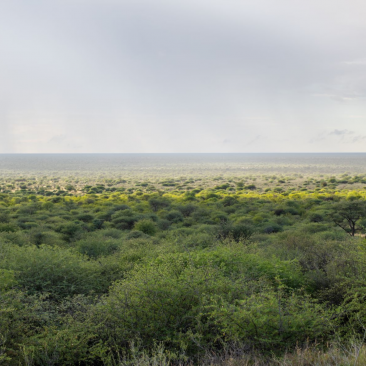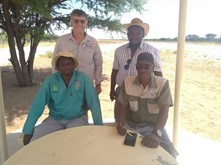
The Forest Stewardship Council® (FSC®) has helped bring about a paradigm shift from previous practices to profitable and environmentally responsible production of charcoal by Namibian communities.
Some years ago, the Namibian government through the Directorate of Forestry placed a moratorium on the commercial harvesting of biomass resources in communal areas. The moratorium prohibited communities from harvesting bush resources for charcoal and wood products. This came because of uncontrolled and unsustainable harvesting practices which totally ignored the permit conditions. These high impact operations also resulted in an increase of conflicts related to land-use rights. Workers’ rights and their health and safety risks were largely ignored. Benefit sharing with local communities, the land and resource owners and environmental values were also not considered at all. The bottom line was that there was limited adherence to legal, environmental and social obligations.
Following on this, the Namibian Directorate of Forestry implemented strategies to resume communal bush biomass utilization as there was an exponential increase of invader bush species encroachment. However, a four year drought forced communal farmers to seek additional income and in the process restore the woodlands to improve grazing and by default, the ecologies of these landscapes.
The FSC Communal Pilot Project, implemented by the Directorate of Forestry in partnership with the German aid organisation The Deutsche Gesellschaft für Internationale Zusammenarbeit GmbH (GIZ) and Debushing Advisory Service (DAS), a division of the Namibia Biomass Industry Group (N-Big), brought about a paradigm shift. The project is supported by the local FSC Southern Africa office. Communities adopted a well informed and responsible approach to removing the encroached bush from their land and converting this into a profitable return. This was made possible through the implementation of the Namibian Forest Stewardship Standard with the core objectives of environmentally responsible, socially acceptable and economically viably use of the woodland resources.
Three communal farmers in Ozonahi, Otjituuo and Okondjatu in the Okakarara area of the Otjozondjupa region of Namibia were certified to the FSC standard which means that not only is the land being used in a responsible manner, but they also gained access to European markets that would be reluctant to source charcoal from uncertified woodlands. During the first season almost 18 000 tonnes of charcoal and fines were thus produced and sold for a gross revenue of more than N$33 million. This process created 15 direct employment opportunities. Additionally, 102 community members including three Forest Management Bodies benefited from this process in a short space of 4 months.
During the initial stages of the pilot project, Mr. Ujamba was the first communal farmer in Namibia to become FSC certified under the CMO Group Scheme on the 5th of November 2020. After the pilot, he was happy with the income generated and the impact it brought to his life.

The buyer was also excited to gain access to responsibly sourced charcoal from communities and expressed that there is great potential in responsible charcoal production in communal areas.
In Namibia, the production of charcoal is possible through responsible low impact forest management. Bringing communal farmers into a harvesting and production process that follows responsible forestry and chain of custody practices that are certified by the FSC has resulted in the restoration of Namibian landscapes whilst opening doors of opportunity for improving the livelihood of local communities.
For more information contact:
Mr Jackson Hindjou
email: j.hindjou@fsc.org
